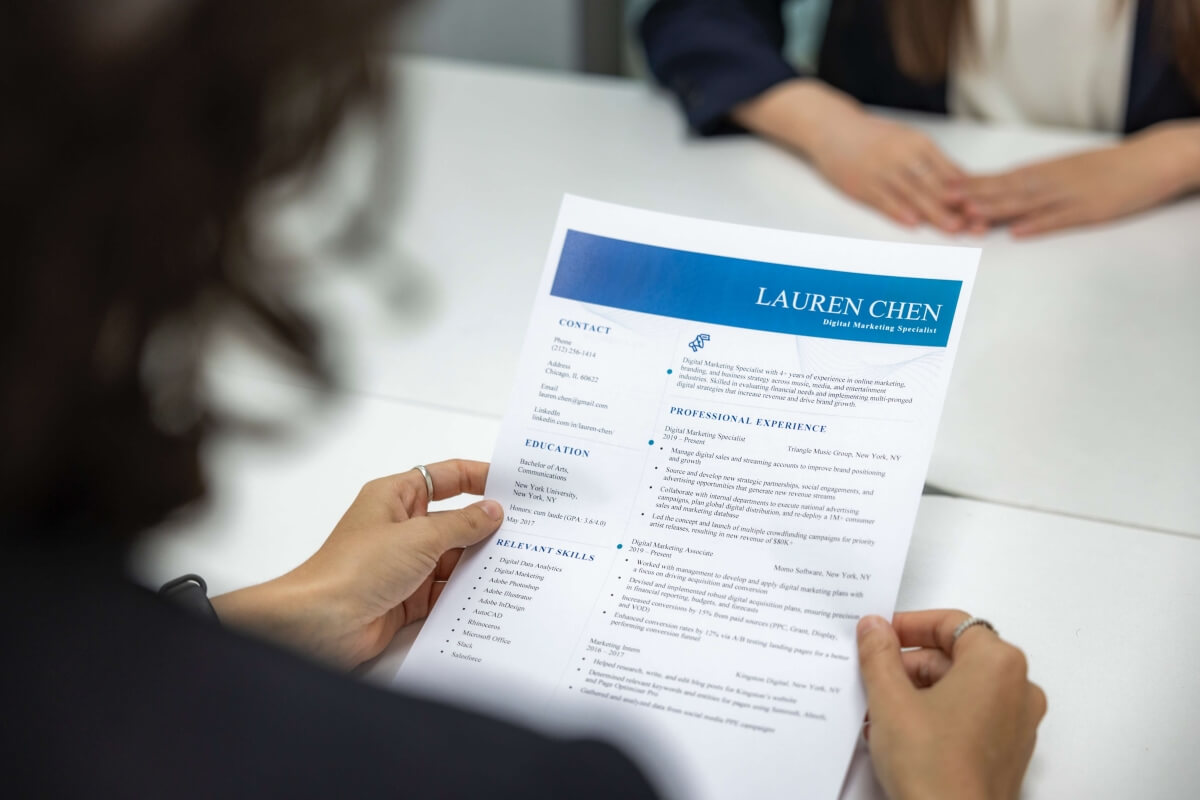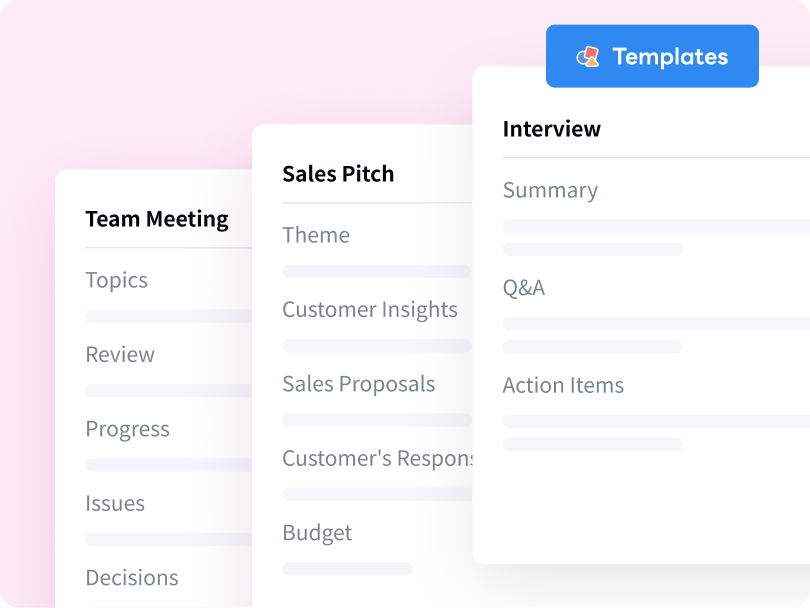Recent marketing graduate with one year of experience in creating marketing campaigns as an intern at XYZ Company. Adept in social media marketing and search engine optimization (SEO). Eager to learn more about optimizing product value and growing businesses.

How to Write a Resume Summary (With Example)
Record, transcribe and summarize conversations with one click.
The reality of applying for jobs (and getting selected for one) now is much different than it was a decade ago. Many recruiters and hiring managers today rely on an automated applicant tracking system (ATS) and algorithms to scan the applicant's resume with the right keywords.
Once your resume passes the ATS testing, the role of resume summary starts. It's the first thing that the recruiter reads — and determines whether you'll be called for an interview or kicked to the 'no thanks' pile.
So, how to write a resume summary that helps the managers understand your skills and experience are actually the perfect fit? Here is your answer: I asked recruiters what they look for when scanning the resume summary — and based on the information gathered, here are the important tips at the top of everyone's list.
What is a resume summary?
Writing a personalized resume summary statement for each role is the biggest time sink when applying to jobs — but it's one of the necessary ways to make the first impression.
But what exactly is a resume summary? It's a one-paragraph (2-4 sentences long), typically at the top of the resume application, that helps you grab the attention of potential employers and industry contacts.

More importantly, a resume summary can help you cut through the noise, qualify for interviews, and impress the hiring team — as long as you write it well. I hope it goes without saying that you'll need to edit and review the summary and make sure it accurately reflects your skills and experiences — and, more importantly, showcases your personality.
When to use a resume summary?
Employers will notice the summary when they check the resume — and it's important to embrace it and explain why you are the right fit for the job. If you already have professional experience in the field you are applying to, you should write a resume summary. But if you don't, a resume objective seems like a good starting option.
Let me walk you through some cases when you need to include a resume summary.
You want to highlight key skills and experience
There are many (a lot) jobs posted every day — but, to be honest, you cannot apply to every job out there. You'll have to apply to best-fit jobs that match your key skills and experience.
Once you know which job to apply for, the next step is to help the recruiter know you're the right fit for the role — and that's where a well-written and concise resume summary can help.
It will highlight the important details right at the top of the application to help recruiters learn if you both are a good fit for each other.
You want to add keywords
As I've stated in the beginning, recruiters and hiring managers rely on ATS to scan for the right keywords in the long resume.
If those terms aren't placed well in the resume, your document might be directly rejected before a human (hiring team) ever sets eyes on your application.
A resume summary often sums up the entire application in a few lines — and, more importantly, includes all the right keywords.
You want to get noticed
Hiring teams are always flooded with a lot of job applications — covering the best employees, some without the proper experience, and a few others who just applied for the sake of it.
A properly written resume summary is one such thing that pulls together important details that are required to get noticed (or hired).

How to write a professional resume summary?
Condensing an entire resume application into three sentences is no easy job, and I've easily lost hours staring at the blinking cursor, writing, rewriting, condensing — and so on. But that does not mean we all can skip writing summaries — after all, they are most likely to get you the job.
A resume summary, sometimes called a resume statement or career summary, is an effective way to gain the attention of a recruiter in a few seconds — but it can be challenging to personalize this summary at scale. That's why most summaries are, well, crap. One approach to writing the CV summary is following the proper steps I've outlined below.
Tailor summary to the position
It's not about writing any resume or work summary — it's mainly about writing one that's tailored to the job position you are applying for.
If you've been hunting for jobs for a while, you have probably found yourself drafting nearly identical summaries to all hiring managers and recruiters over and over.
It's tedious to craft a personalized resume and summary every time — but it's usually one winning strategy. Clearly explain why you're fit for the role and how you can use your expertise to help the company.
Showcase your skills (or selling points)
You cannot be successful in any job without soft skills or hard skills — and that's why you need to highlight them right at the top.
The most competent manager won't be good at their job if they cannot communicate their thoughts clearly to the team.
Your experience summary should include how much you've honed your craft along with the necessary soft skills to support it.

Use action verbs and power words
Don't write like you're following the 'fake it til you make it' approach — instead, use action verbs and power words to describe your experience and skills.
You might be tempted to use words like responsible for, team player, managed, and so on — but that's not how you stand out. Focus on writing strong adjectives that demonstrate your skills and make the summary worth reading.
Notta offers the most integrated AI meeting notes, summaries, and action items so nothing gets missed.
Example of a resume summary
If you're a young adult (a fresher or a student), you probably don't have much to write about your experiences. But that does not mean you don't have anything to write. Even if you are applying for an entry-level job, you can talk about your field of study, relevant skills (you might have learned in internships), related school or college projects, and a conclusion.
Here, I've put together a resume summary example you can use — to get started right away.
Resume Summary Example for Young Adults
Tips for writing a resume summary
There are hundreds of resumes, if not thousands, that a hiring manager reads (or scans) daily. I've read a lot of generic summaries — therefore, I know why it's hard to get a job in this competitive market. Here, I've included a few more tips that will help you write the best career summary.
Use AI summary generators
An AI resume summary generator — like Resume Worded, Rezi, and LazyApply — will do most of the work for you. They'll extract the important data from the resume and create an informative summary. Then, all you've to do is edit and add your personality.
Remember, these text summary generators will only be useful if you have a resume in the text format — but what if the available information is in an audio or video file? For example, some experts helped you with what to include and what not in the summary, and you need it in text format.
Thankfully, AI note-taking apps like Notta will help you: it will convert speech to text with high accuracy. Once you have the transcript ready, the Notta AI Summary Generator can summarize the transcript into different chapters, action items, and an overview.

Simply select the template that best fits your needs, and watch as Notta transforms your raw notes into polished, concise summaries. Your time is precious – let Notta help you make the most of it.
Show your value
Your career summary should showcase your value as a candidate. This involves highlighting the past achievements and the impact you've made in the previous roles. For a customer service resume summary example, you could write, 'As a customer service specialist at XYZ company, I increased the customer satisfaction rate by 35%.'
Proofread and edit
Many job seekers often overlook this aspect, but you don't have to. Once you have written the summary, the final step is to proofread and edit it carefully. You'll have to make sure the language is clear and there are no spelling or grammar errors.
With Notta, you can easily generate meeting minutes, turning spoken content into written records with 98.86% accuracy.
FAQs
How to write a professional summary for a resume with no experience?
It's a myth that freshers with no experience can't write a professional summary. I decided to spend a day talking to hiring managers and recruiters — and see what they wanted to read in the fresher's resume summary. Here's what I found.
List Academic Achievements: A great way to start a professional resume summary is by highlighting the academic achievements. Maybe you've participated in a couple of internships, programs, or anything you name it — where you were taught about the aspects of handling a particular job.
Describe Interests and Passions: The typical CV summary should not be a text-heavy document listing stats, figures, and achievements. It's practical — but it's not fun to read or write. Sometimes doing a little different and talking about your interests and passions can help you stand out.
Focus on Technical Skills: Another thing that many experts recommended was to include technical skills and soft skills. Of course, you'll have to keep it short and concise, and there's no guarantee that the hiring manager will be happy to read a longer summary. Try to highlight a few important skills that have a direct relation to the applied job.
What to put in a summary of a resume?
An effective resume summary typically follows a standard structure. Here's one resume summary format you can follow: Professional title (that's relevant to the job you're applying for) + Key experiences (total number of years you've worked) + Top achievements (preferably in data and figures) + Top skills or unique value (that's again relevant to the industry and job).
How long should a resume summary be?
A resume summary shouldn't go beyond an average paragraph (or two to four sentences). But that's not the only rule you've to follow — if you've something worth writing (and engaging), you can write one long paragraph.
Key takeaways
I hope this 'How to Write a Resume Summary' tutorial will help you get started. If you're anything like me who is short on time or wish the process could be a little faster, I've the solution: AI summarizer apps. AI can add a lot of speed — and efficiency — to your job-hunting process.
But a quick reminder: the tools you use should not generate generic information. While AI can help you speed up the task, it's always worth investing the time to ensure the generated summary represents you and your personality.